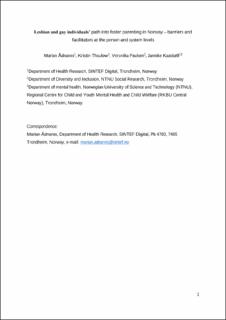Lesbian and gay individuals' path into foster parenting in Norway—Barriers and facilitators at the person and system levels
Peer reviewed, Journal article
Accepted version
Permanent lenke
https://hdl.handle.net/11250/3063385Utgivelsesdato
2023Metadata
Vis full innførselSamlinger
- Publikasjoner fra CRIStin - SINTEF AS [5668]
- SINTEF Digital [2415]
Sammendrag
Growing numbers of lesbian, gay, bisexual, transgender, questioning (LGBTQ) people are becoming foster parents in several western countries. The LGBTQ perspective on the child welfare system has received little attention in practice, research and policy. Despite their increased rights, LGBTQ foster parents continue to face challenges related to fostering. Knowledge is needed on LGBTQ individual perceptions of the process of becoming foster parents, including barriers and facilitating factors. This paper reports on the experiences of 13 gay or lesbian foster parents in Norway. The study shows a lack of knowledge about the possibility of becoming foster parents due to lack of information directed at them as a minority group. Participants felt vulnerable and experienced “minority stress” before encountering the child welfare system, while mainly experienced the encounter with the staff as good and respectful. Although several valued being treated “like everyone else” by the system, others questioned why LGBTQ-specific parenting issues were not raised and discussed. Apart from lack of information, the process towards foster parenting seemed mostly hampered by participants' own assumptions that sexual identity would be a barrier and to some extent biological parents' refusal. The study suggests that foster care and child welfare services would benefit from information in recruitment of foster parents, aiming at being more inclusive. Furthermore, we address gender and sexuality diversity related to foster care work and highlight the strengths and challenges it may offer.
